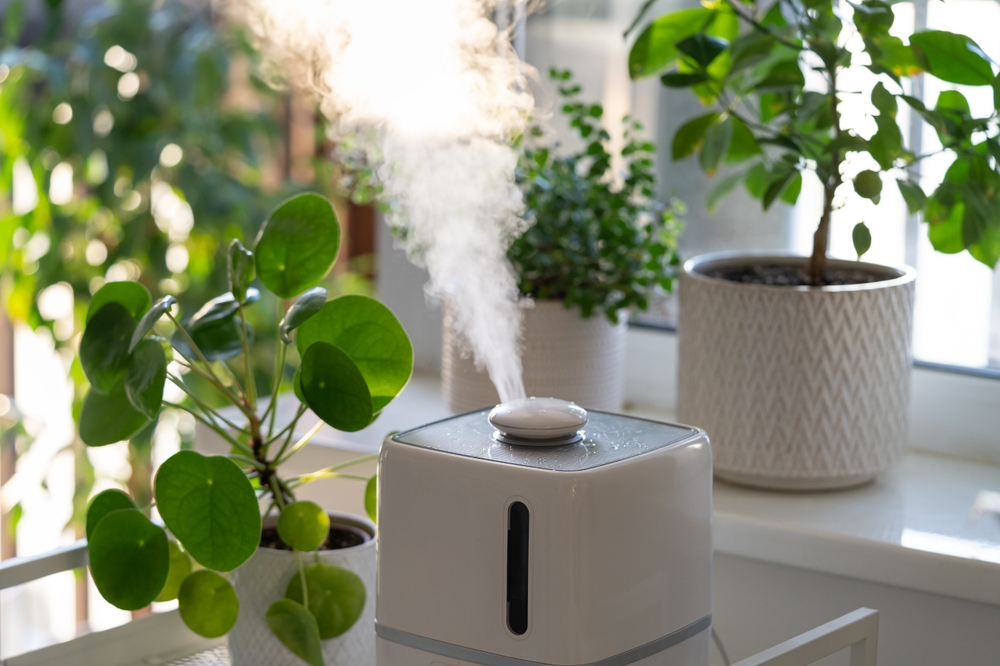The cold winter weather can impact your eye health in various ways due to factors like dryness, temperature, and weather. By taking good care of your eyes, you can enjoy clear, healthy vision and sail through winter smoothly.
Keep reading to learn more about 5 of the best tips for healthy eyes this winter.
1. Add a Humidifier

The chilly winter weather has most people spending more time indoors, cranking up the heaters to stay warm. However, heating systems remove moisture from the air, causing or worsening dry eyes.
Dry eyes can leave you with double vision, a nagging, gritty feeling, eye pain, and other bothersome symptoms. The more you use your heater, the drier the air and your eyes may become.
You can still keep warm and toasty while protecting your eye health by using a humidifier in the spaces where you spend the most time. Having a humidifier in your bedroom, living room, and even office can help add moisture back into the air and combat dry eyes all winter long.
2. Take Screen Breaks Often
Being cooped up indoors usually means more screen time, whether it’s for leisure or work. However, staring at your phone, computer, laptop, or TV for extended periods can lead to digital eye strain.
You may experience dry eyes, blurred vision, eye fatigue, headaches, and increased sensitivity to light when you have digital eye strain. A good thing to do is to ensure you take frequent screen breaks and follow the 20-20-20 rule whenever you use digital devices.
Every 20 minutes, look a distance of 20 feet away for 20 seconds. These small breaks can relieve the symptoms of digital eye strain.
Additionally, remember to blink intentionally when taking these breaks. You blink approximately 15 times per minute.
However, when staring at screens, your blink rate decreases by about 50 percent, which can trigger or exacerbate dry eyes. Blinking on purpose helps lubricate your eyes, increase eye comfort, and alleviate dry eyes.
By protecting your eyes from the effects of digital screens, you’ll still get to work on your laptop, enjoy scrolling through your phone, and binge-watch your favorite movies throughout winter.
3. Wear Sunglasses

A warm coat, scarf, and hat are winter must-haves. But, remember your sunglasses too. Shorter days and chilly temperatures can trick you into thinking you don’t need eye protection.
However, the sun’s ultraviolet (UV) rays can still penetrate clouds when the sky is a dreary gray and harm your eyes. Moreover, snow can reflect up to 80 percent of UV light, increasing your exposure to the harmful effects of the sun.
The sun emits ultraviolet rays which can cause pterygium, a growth on the cornea, and photokeratitis or sunburn of the cornea. Prolonged exposure to the sun’s UVA and UVB rays can also heighten your risk of cataracts, macular degeneration, and skin cancer of the eyelids.
Quality sunglasses are your best defense against the sun. They’re just as important in winter as they are in the warmer months. Make sure your sunglasses offer 99 to 100 percent UVA and UVB protection for clearer, healthier vision.
4. Drink More Water
Proper hydration is essential to your body, including your eyes, no matter the season. Still, you may find it challenging to consume enough water during blustery winter days.
Your eyes constantly make tears that keep them lubricated, comfortable, and healthy. Not drinking enough water can prevent your eyes from producing adequate or good-quality tears, leading to dry, irritated eyes.

In contrast, remaining hydrated can provide relief from blurred vision, light sensitivity, eye redness, and other bothersome symptoms of dry eyes. Aim to drink the recommended daily water intake of about 2.7 liters per day for women and 3.7 liters for men.
If it’s challenging to get this amount of water down when it’s cold, try soups, broths, and stews. They can keep you warm and up your water intake.
You can also try infusing water with your favorite fruits to create a drink you enjoy consuming and hit your hydration goals. While mugs of hot coffee, tea, and cocoa are winter staples, they can be dehydrating.
So consider limiting their intake and swapping them with herbal teas and sugar-free hot cocoa to help you stay hydrated. Hydrating foods such as watermelons, sweet potatoes, winter squash, tomatoes, and celery can also help you maintain your daily water intake.
5. Eat for Your Eyes
Eating the right foods can promote better eye health this winter and well into the future. Some of the nutrients your eyes will love include:
Omega 3 Fatty Acids
Omega-3 fatty acids can lower your risk of developing dry eyes. They may also alleviate the symptoms of dry eyes.
Additionally, omega-3 can decrease your risk of glaucoma and macular degeneration. Sources of omega-3 fatty acids include salmon, mackerel, tuna, herring, cod liver oil, sardines, and anchovies.
Vitamin C

Vitamin C protects your eyes against UV damage and may lower your risk of cataracts. Foods high in vitamin C include oranges, green and red peppers, peaches, strawberries, and papayas.
Vitamin E
Vitamin E can protect you from dry eyes. It may also reduce the risk of developing cataracts and age-related macular degeneration.
Vitamin E can be found in sunflower seeds, almonds, fortified cereals, wheat germ oil, pecans, and avocados.
Lutein and Zeaxanthin
Both of these nutrients can decrease your risk of cataracts and macular degeneration. Collard greens, peas, spinach, peas, broccoli, kale, and grapes are excellent sources of lutein and zeaxanthin.
In addition to these tips, frequent eye exams at Jacksonville Eye Center can help keep your eyes healthy this winter and beyond. You’ll be able to enjoy winter and everything it has to offer without compromising your vision.
Do you remember when you had your last eye exam? Schedule an appointment at Jacksonville Eye Center in Jacksonville, FL, today to learn more about caring for your eyes this winter.

